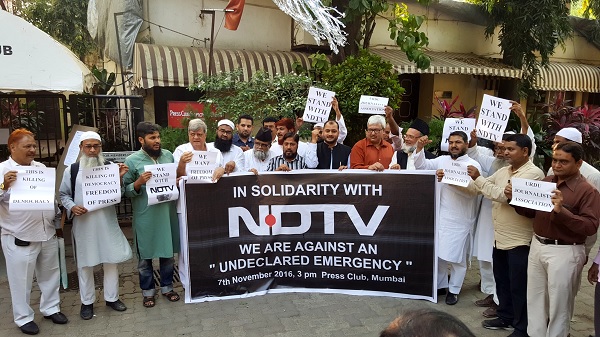
by admin | May 25, 2021 | Books
 By Vikas Datta,
By Vikas Datta,
Title: Fascism: A Warning; Author: Madeleine Albright; Publisher: William Collins; Pages: 304; Price: Rs 699
If not the outcome of the Second World War, the Berlin Wall’s fall seemed to pave the way for democracy’s triumph — but nearly three decades later, we may be forced to rethink this comforting thought. The recent growth of authoritarianism, emphasising “tradition” and conformity and villifying globalisation, immigration and dissent are pointers that fascism is certainly not in the “dustbin of history”.
We have long thought that it was the 20th century which saw the global clash between democracy and fascism, where the latter was defeated. But, as we find in this book, this defeat was far from conclusive and fascism never ever really went away — and certainly not far enough.
Fascism existed even in the traditional homelands of democracy, where it still could come out most unexpectedly — as the Brexit vote and the election of Donald Trump shows, contends former US Secretary of State Madeleine Albright in this book.
Asking why democracy “is under assault and in retreat” (as per Freedom House), why so many people in power are “seeking to undermine public confidence in elections, the courts, the media, and — on the fundamental question of earth’s future — science”, why differences are widening and, ultimately, why we are once again talking about Fascism, she gives an unequivocal answer — the current US President.
“One reason, frankly, is Donald Trump. If we think of fascism as a wound from the past that had almost healed, putting Trump in the White House was like ripping off the bandage and picking at the scab,” says the first woman to be Secretary of State — and then seeks to make her case.
But this is far from just another anti-Trump rant, no matter how elegantly phrased, and not only focussed on him.
For in this a timely, informative and frankly worrying account and analysis, Albright travels from the original fascist, Benito Mussolini and his Nazi contemporary Adolf Hitler to Slobodan Milosevic’s Serbia; from the “Hermit Kingdom” of North Korea under the Kims and Hugo Chavez’s Venezuela, and from Russia in its Soviet phase under Stalin (and now under Vladimir Putin) to Recep Tayyep Erdogan’s Turkey and Viktor Orban’s Hungary.
However, she does not term all of these as fascist, but instead shows how some of their actions tend towards fascism and which ones may be misguided or wrong but aren’t fascist.
And Albright, who had suffered under fascism twice — with one version engulfing her homeland and a large part of her family, and then another from the opposite direction made them refugees again — also seeks to analyse fascism’s pathology, why we fail to recognise it, or most importantly, why a lot of us are persuaded by it.
Answering the second question first, she contends nothing beats fascism as the ultimate political pejorative — used for any corporate bigwig by a leftist, for Barack Obama by those of the far-right, for strict parents by any rebellious teen, as well as for teachers, feminists, chauvinists, yoga instructors, police, dieters and many more.
However all this overuse is “draining potency from what should be a powerful term”, and hence blinding us to its ominous presence, she says.
Albright then goes on to identify what fascism is really and how to recognise its adherents. She delineates the tactics of its leadership, which span drawing on resentments to the desire to be part of a bigger, powerful whole, and how they consolidate power, chiefly by seeking to control information, to arrive at a definition of fascism and tracing its origins in the modern, industrialised world.
Along with the case studies mentioned above, including her own interactions with most of the contemporary figures listed here, she goes on to present an alarming set of futures for the US under Trump (and beyond), why people get disenchanted with democracy, the less than salutary role of social media and big business to make some incisive points about fascism and how we can — and should — tackle it.
Albright says no country or society, no matter how much it prides itself on its democratic traditions, can remain immune, given the changing political and economic dynamics.
We can only be prepared to recognise the warning signs and this shows how.
(Vikas Datta can be contacted at vikas.d@ians.in )
—IANS

by admin | May 25, 2021 | Opinions

By Ram Puniyani
The decision to put a one day ban on Hindi NDTV, since withheld, came as a big jolt to the country. A major channel was asked to stop the broadcast. The charge was that its broadcast on Pathannkot revealed sensitive information regarding national security. On the same Pathankot issue this Government had allowed the Pakistan authorities to come to the same airport. The channel (Hindi NDTV) pleaded that its program was very balanced and nothing related to national security was relayed which was not on the public domain through other media. It is clear that NDTV Hindi in particular has been debating issues which are uncomfortable to this Government. Apparently the pressure of all round protests forced the Government to hold its decision for time being. The issue of Bharat mata ki jai, nationalism, the issues related to JNU and Hyderabad Central University (HCU), Una in particular, were debated in ways which critical of the ruling party.
Since this dispensation, Modi Sarkar, has come to power there is a qualitative change in the political scenario. Right at the beginning we witnessed many attacks on Churches. We saw the interference in the institutions of national importance like FTII, IITs, JNU and HCU among others. The incompetent persons with ‘right wing’ leaning were installed and have been brought in at most of these. The places of learning are a special target. The JNU was targeted labeling it as the den of anti nationals. A cooked up video was used to defame the student leaders of JNU, in HCU Rohith Vemula had to commit suicide. The growing intolerance led to returning of awards by luminaries of our society. The issue of beef was blown up to the sky; the emotive hysterical projections were propped up leading to the death of Mohammad Akhlaq, many other traders and later the dastardly attack on the dalits in Una in Gujarat. Many sections of media have been brow beating the liberals and secular elements while giving a free run to Hindu nationalists.
It is in this backdrop that the Bhopal encounter has taken place where eight Muslim youth alleged to be terrorists were killed in an extra judicial manner. The incident as it has been presented clearly shows that the version of the police has lots of holes in it. In JNU again one student Najeeb has been missing for last three weeks and his mother was manhandled by the police. Is it mere emergency, where such blatant violations of human and democratic rights are taking place? Emergency was a condemnable authoritarian regime where from the top a dictatorship was imposed. press censorship was brought in. Surely the present times are having lot of difference.
To begin with the dominance of corporate and doing away of the rights of workers and farmers along with undermining the schemes like MNREGA, Right to Food, Right to Health and Right to education show that the orientation of this Government is to ally with the big capital. The complimentary part of this phenomenon is the promotion of Hindu nationalism. Right from the word go; the sentence, ‘I am nationalist and I am born in a Hindu family’ by Modi set the tone of shape of things to come. With this the targeting of minorities, on the issue of Uniform Civil Code and beef is there. The ultra-nationalism is manifest in the handling of Kashmir and relations with Pakistan in particular. The use of Uri and consequent surgical strike to bloat the chest of this political dispensation is very much in the air. The permission of thousands of NGOs working in the social sector has been stopped on frivolous grounds. The attack on Pakistani artists is another instance where the sectarian nationalism is having an unrepentant march. It is to be remembered that we have a bilateral trade to the tune of thousands of crores with Pakistan. With China similar sentiments have been flashed by talking about boycott of Chinese goods, despite the fact that the contract of proposed Saradar Patel statue running in to thousands of crores has been given to China. The popular sentiments are being guided into negativity and hate towards neighboring countries, religious minorities and the human rights activists.
The stifling of democratic freedoms, welfare of the poor, the intimidation of minorities and human rights defenders is running parallel to the creation of mass hysteria and mobilization of masses to uphold the agenda of ruling party. Those questioning the state are being put in the dock. In a democracy it the state which is answerable to the people. Now this formula is being reversed. In democracy questioning the authorities is the bedrock of the Constitution. So something is seriously amiss, something which is more sinister than the emergency. Something which has deeper portents for the democracy is being legitimized and glorified by the ruling party and the parent organization of the ruling party.
So how does one characterize it is the matter not of mere academic concern. Recently CPM leader Prakash Karat had stated that the present dispensation is mere authoritarian and not fascist. The distinction between two has been a matter of historical debate. The main features of fascism has been centrality of state over people, overarching Leader, dominance of Corporate, doing away with rights of poor, targeting of minorities, ultra nationalism and aggressive policies towards the neighbors. The crucial point for those wanting to preserve the democracy and Indian Constitution is to build up social and political alliances, irrespective of some differences, to fight this raging politics of Hate, politics of sectarian nationalism.
During 1990s, BJP did project itself as a ‘Party with a Difference’, and that is so much true. It is the only party whose agenda is guided by the Hindu nationalist RSS, which rejects democracy and secularism as Western imports and wants to stick to the laws of Hindu Holy Scriptures. These scriptures are the same, one of which was burnt by Ambedkar as a mark of protest against its values of caste and gender hierarchy, values of Brahminism. Debates can continue but politics to defend Indian Constitution cannot wait!


